It’s been a while since I shared one of Smitty’s stories with you. This was written on May 24, 1991, in Portland, Oregon. My grandparents got married about the time Clare was graduated from the University of Idaho. It was in the depths of the Great Depression. Smitty had graduated earlier with an electrical engineering degree, but it would be some time before he was able to do that exclusively. Being an engineer, however, he was able to find work during that hard time.
The Short Load
By Laurence M. Smith
The problem with writing is that it is hard work. It requires a lot of thinking. That is why I put it off as long as possible. And it is probably why so few people ever get involved in writing. It is not particularly rewarding since others are more interested in their own stories.
Be that as it may. It was our first wedding anniversary (1935). We were living in a small cinder block house, N. Howard St. in Spokane. As I remember it, the house was just barely adequate for two people. However, the rent was only $17.00 per month.
I received an inquiry from the Bureau of Public Roads regarding my availability for work the coming summer in Montana. Since I was working at a job there in Spokane I didn’t like, I responded that I was available for the Montana job.
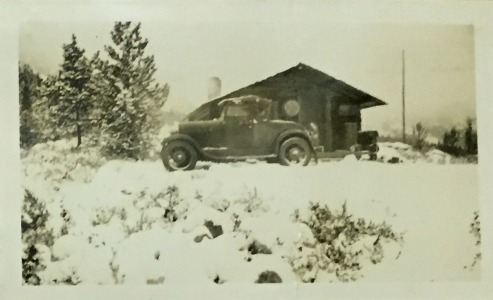
Thus, on the last week of May or the first week in June we loaded the Model “A” Ford roadster with our possessions. We were able to get them all in the trunk of the Ford. It took some doing, of course. I always took the trunk lid off and set it up at the back of the trunk so that we could pile things against it. We used a lot of rope to tie things down.
The last item to go on top of the load was a #2 wash tub. This tub was used for two things. To wash clothes, using a wash board, and for taking a bath in on Saturday nights.
(I have often said that a good author could write a novel based on our life experiences in 1935.)
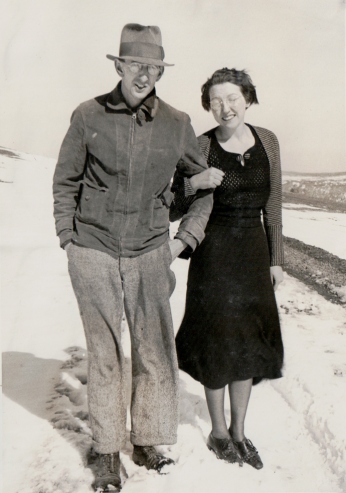
Laurence (Smitty) and Clare (Bobby) in Montana, 1935
When we left Spokane the weather was such that we had to install the side curtains. Our heat came from the hot engine through a metal tunnel ending at a hole in the front seat floor boards.
In these times we had the energy and the courage to do the things we had to do to survive. Believe me, in the depression years, survival was about all that most people accomplished.
At the end of the first day away from Spokane we found ourselves in Kalispell. We went to a hotel to get a room for the night. I have the impression of walking up a flight of steps to the hotel desk. The desk man turned the register for me to sign in and then he changed his mind. He turned the book to himself and said, “Sorry all our rooms are taken.”
Rooms at this time were $4.00. I seem to recall that we found a hotel where the desk man was more interested in $4.00 than in the way we looked, in any event we got through the night in Kalispell.
My orders were to report to the resident engineer at a temporary field office in Essex, Montana. The engineer’s name was Ray Schwegler. We kept in touch with the Schweglers for years after all this took place.
The Bureau of Public Roads had arranged for a sub-contractor with a shovel and some trucks to clean out the ditches along a twenty mile stretch of the highway east of Essex. The ditches had filled up by erosion of the slopes during the winter, along this stretch of highway that had been excavated the summer before. In this area, highway construction was only possible during the late spring and summer months. The highway we were rebuilding through the mountains later became U. S. 2.
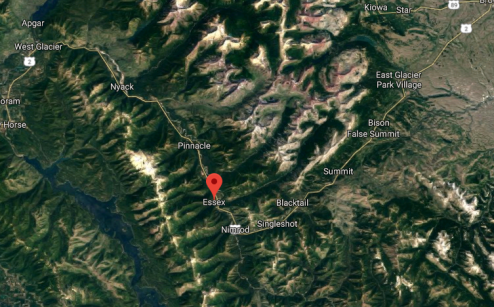
Essex sits along Hwy 2 and the railroad route between East Glacier and West Glacier
I was assigned the task of checking the truck loading of the excavated ditches. The trucks, filled, would contain about 4 cubic yards of material. I would then give the truck driver a ticket for the 4 yds. of haul. The tickets were made with a carbon copy. Thus, the contractor had a record of what he was to be paid for and the government had the basis for making payment.
On this particularly nasty cold day, I was watching one truck being loaded and an empty truck was waiting. The truck under the shovel was about one-third full when the contractor boss showed up. He was the type you would cast in the movie, “The Dirt Contractor.” A very large man with a consistent, even temper – always mad.
As soon as he got out of his pick-up, he started yelling at the driver of the truck under the shovel, “Get that truck moving, can’t you see there’s another truck waiting?”
He scared the truck driver into pulling out before the truck bed was half full.
The boss came over to me and said, “I’ll take the ticket for that load.”
That’s when I said, “And you will fly to the moon, too! You don’t get a ticket for that load!”
This started a considerable jawing match ending up as follows:
“Who is your boss? I’m going to go get him”
I said, “You just do that, I’ll even tell you where you can find him.”
In about a half hour here came Schwegler and the “Ogre.” Schwegler asked me what was going on and I told him the truck left half loaded so I refused to give out a four yard ticket.
With that, Ray lit into the contractor, “There’s your answer! And let me tell you something, these drivers had better stay under that shovel until the inspector says they are loaded or you will come up short of payment tickets.”
Now, you can believe me when I state that I never had any more trouble with this contractor.
We were here at Essex only about three weeks cleaning out ditches, then we moved to East Glacier for the rest of the summer construction. That, of course, is another story.
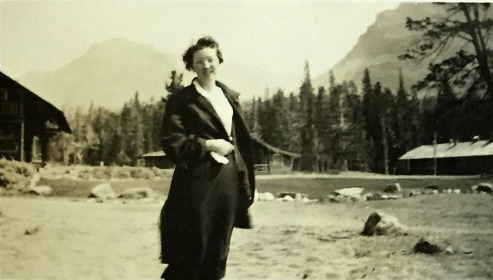
Clare (Davis) Smith in Glacier National Park, 1935
[Note: Smitty never did write the story of East Glacier, sad to say. – EL]
Ramon “Ray” Miles Schwegler (1907 – 1987), was a graduate of Oregon State University in Corvallis, Oregon, with a degree in civil engineering. He married Blanche Jones in Seattle in 1933 and they moved to Missoula, Montana, shortly after for Ray to work as a highway engineer. By 1940, he had moved to Portland for the remainder of his life. Ray was just a year older than Smitty. I found these two photos of Ray in Smitty’s collection:
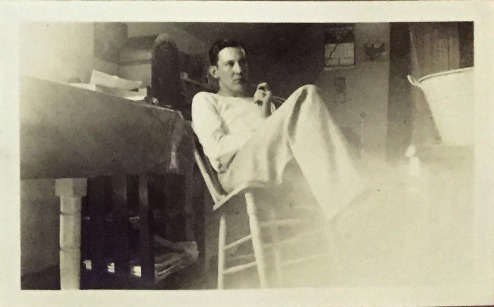
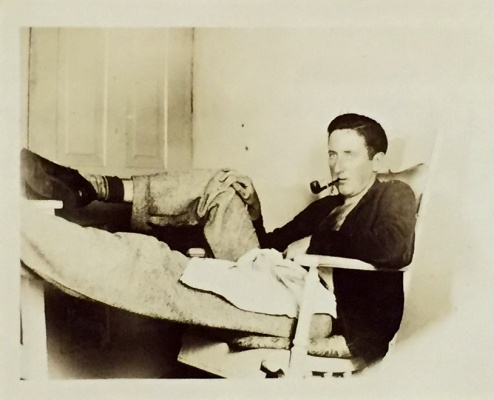
Feature image: Graduating class about 1930, University of Idaho. Smitty is in the middle of the back row. He was the only one in his family to attend college.
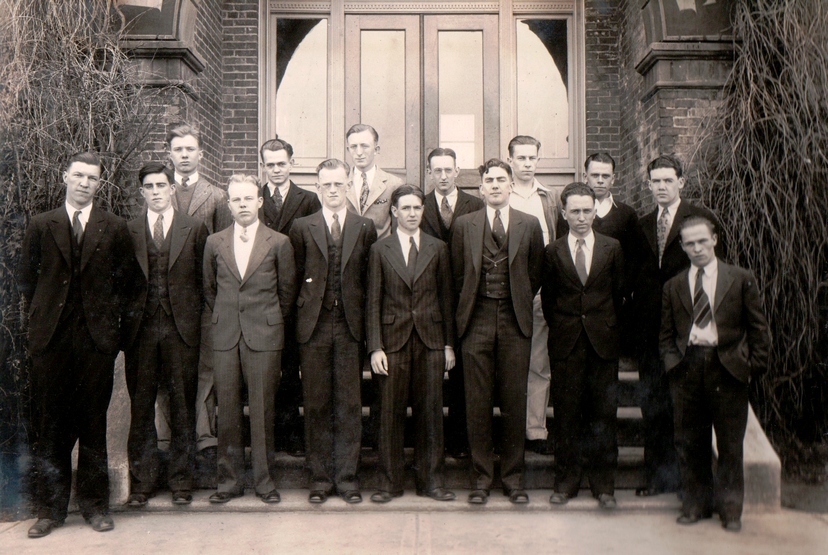
Fascinating portrait of the times!
LikeLiked by 1 person
I think they were pretty lucky, all things considered. Who wouldn’t love getting paid to be in Glacier for a summer?
LikeLiked by 1 person
I can imagine living that life. Trips were so much slower and adventurous. I can also imagine a $4 hotel today could cost about $100 just in lice and bedbug medication.
LikeLiked by 1 person
LOL. The first guy must have thought my grandparents were bringing their own!
LikeLiked by 1 person
Very interesting! 🙂
It was a very tough time (which hopefully) will not be repeated in any way.
LikeLiked by 1 person
Couldn’t agree with you more!
LikeLike
What different times they were! Very charming story.
LikeLike
As I am supposed to be cleaning out the bookcases I nearly swept by your post. After all I should not be looking at the computer. But then I read Smitty’s comment on writing, “It is not particularly rewarding since others are more interested in their own stories.” How could I stop reading after that? Such an enjoyable piece of history.
Now I must get back to that bookcase.
LikeLiked by 1 person
That was an interesting insight. I wasn’t sure I should leave those remarks in, but then didn’t feel right about editing anything other than a little punctuation. Glad you liked it!
LikeLiked by 1 person
Fascinating story and quite the storyteller, too. Loved the photos!
LikeLiked by 1 person
I wish he’d written more, but I’m grateful for what I do have. Thanks for visiting!
LikeLiked by 1 person
Great post! I’ve been wanting to visit Glacier National Park – this post reminds me I must make a plan to do it! Thanks!
LikeLiked by 1 person
Better get there while there’s still a glacier or two!
LikeLike